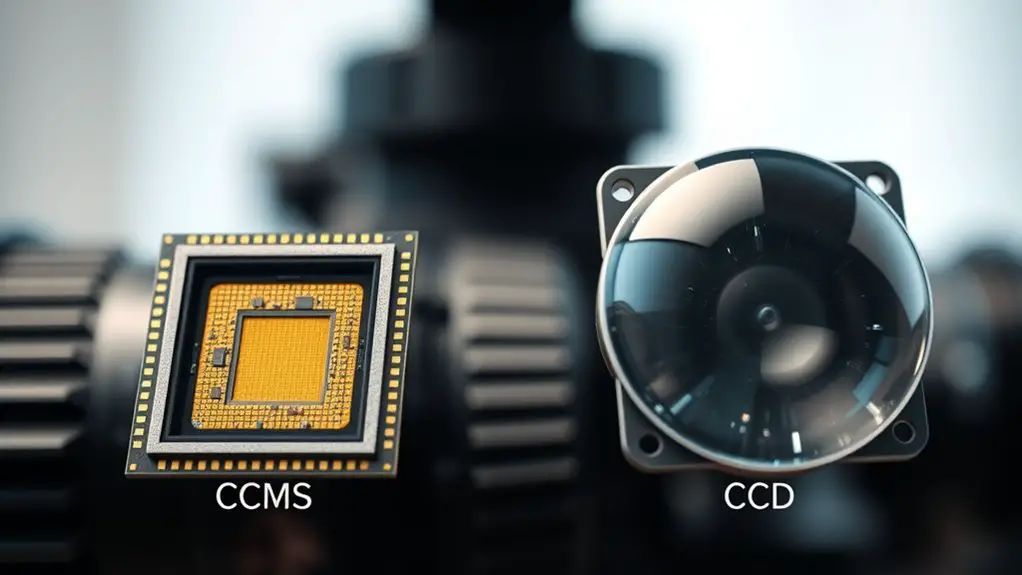CMOS and CCD sensors greatly impact video camera performance. CMOS sensors offer faster readout speeds, greater energy efficiency, and lower production costs, making them suitable for a variety of applications. In contrast, CCD sensors excel in low-light conditions and dynamic range, providing superior image quality. When choosing a sensor, consider factors like light sensitivity, power consumption, and project budget. Understanding these differences can guide your decisions and enhance your filmmaking outcome. You’ll discover more details on each option.
Understanding CMOS and CCD Sensor Technologies
When choosing a video camera, it’s essential to understand the differences between CMOS (Complementary Metal-Oxide-Semiconductor) and CCD (Charge-Coupled Device) sensor technologies, as these components greatly influence image quality and performance. The sensor architecture of CMOS chips allows for faster readout speeds and lower power consumption, making them suitable for a range of applications. In contrast, CCD sensors typically excel in light sensitivity due to their ability to transfer charge more efficiently across the sensor. This efficiency can lead to better performance in low-light conditions. Understanding these differences empowers you to make an informed choice, aligning your needs with the unique strengths of each sensor technology. Ultimately, it’s about finding the right balance for your creative vision.
Image Quality Comparison: CMOS vs. CCD
Image quality stands as a critical factor in the performance of video cameras, with CMOS and CCD sensors exhibiting distinct characteristics that influence their output. When you consider image resolution, CMOS sensors often provide superior performance regarding pixel density, allowing for more detailed images. However, CCD sensors typically excel in dynamic range, capturing a broader spectrum of light, which results in better highlight and shadow detail. If you’re shooting in varied lighting conditions, CCD’s dynamic range can greatly enhance image quality. Ultimately, your choice between CMOS and CCD will depend on your specific needs: whether you prioritize finer detail or richer tonal representation. Understanding these differences will empower you to make informed decisions based on your creative goals.
Power Consumption and Efficiency
While both CMOS and CCD sensors serve the purpose of capturing video, their power consumption and efficiency vary considerably, impacting overall camera performance. Understanding these differences can help you make informed choices.
- CMOS sensors typically offer higher power efficiency, consuming less energy during operation.
- CCD sensors may provide superior image quality but often require more power, leading to shorter battery life.
- Efficiency affects sensor longevity; CMOS sensors generally last longer due to reduced thermal stress.
Ultimately, if you’re prioritizing power efficiency for extended shoots, CMOS sensors are likely your best bet. However, if image quality is paramount, consider the trade-offs in power consumption and sensor longevity associated with CCD technology.
Cost Implications for Filmmakers
Although both CMOS and CCD sensors have their advantages, the cost implications for filmmakers can considerably influence equipment choices and project budgets. CMOS sensors generally offer lower production expenses, making them a popular choice for budget-conscious filmmakers. Their affordability often translates to savings on camera bodies and lenses. In contrast, CCD sensors, while known for superior image quality, typically come with higher costs, which can strain budget considerations. For independent filmmakers or those operating within tight financial constraints, evaluating the price-performance ratio of these sensors is essential. By understanding these cost implications, you can make informed decisions that align with your creative vision and financial realities, ensuring that your project remains on track without compromising quality.
Choosing the Right Sensor for Your Project
How do you determine the right sensor for your project? Selecting between CMOS and CCD sensors hinges on your specific project requirements and sensor compatibility. Consider the following factors:
Choosing the right sensor for your project requires careful consideration of specific needs and compatibility.
- Light Sensitivity: Assess your filming environment; low-light conditions may favor CCD sensors.
- Power Consumption: If battery life is a concern, CMOS sensors typically consume less power, extending your shooting time.
- Image Quality: Analyze the resolution and dynamic range needed; CCD sensors often excel in color accuracy.
Frequently Asked Questions
Can I Convert CCD Cameras to CMOS Technology?
You can’t directly convert CCD cameras to CMOS technology due to sensor conversion challenges and technology limitations. Each sensor type has distinct architectures, making such a transformation unfeasible without redesigning the entire camera system.
How Long Do CMOS and CCD Sensors Last?
Think of a tree’s rings, each representing sensor longevity. As technology advancements flourish, CMOS sensors typically outlast CCDs, often enduring years longer. Your choice hinges on balancing performance needs with future-proofing against evolving innovations.
Do Weather Conditions Affect Sensor Performance?
Yes, weather conditions greatly influence sensor performance. Variations in temperature and humidity can affect sensor sensitivity and overall functionality, leading to decreased image quality. It’s essential to take these environmental impacts into account when planning your shooting conditions.
Are There Hybrid Sensors Combining CMOS and CCD?
Yes, there are hybrid sensors that combine CMOS and CCD technologies. These hybrids leverage sensor advantages from both types, offering improved image quality, low power consumption, and enhanced performance, giving you greater flexibility in various shooting conditions.
What Maintenance Do These Sensors Require?
For best performance, you’ll need regular sensor cleaning to remove dust and debris. This maintenance guarantees accurate image capture and enhances performance improvement, allowing you to achieve the best results from your video equipment.

